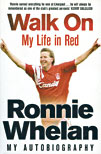 My life in red
My life in red
by Ronnie Whelan
Simon & Schuster, £18.99
Reviewed by Stephen Adams
From WSC 302 April 2012
Ronnie Whelan played for Liverpool in an era that has already passed into legend. The players, managers, trophies and the style with which they were won have all been celebrated by those who witnessed and contributed to the point where there is not really much left to tell.
Whelan describes himself as a cog in the great red machine and unfortunately his story can be a bit of a grind in places. Bob Paisley was quiet. The Jocks loved a joke. Steve Nicol was thick. Bruce Grobbelaar was funny. They nearly all loved a pint. Those looking for controversy will be disappointed, although he does save some criticism for former bosses Graeme Souness and Jack Charlton. Criticism but not animosity – you sense Whelan does not feel much of that for anyone.
He comes across as a thoroughly likeable person, totally obsessed with the game of football. His father played twice for the Republic of Ireland but never made it as a professional and Ronnie knew from an early age that he only wanted to follow one career path. His relationship with his father is one of the standout features of the book. Ronnie senior managed to smuggle his son, then aged seven, into the Manchester United dressing room when they played a friendly in his native Dublin. When he repays the favour 21 years later, walking his father through the Wembley tunnel before the 1989 FA Cup final, it is difficult to know which of the two was prouder. The tale takes on added poignancy when Whelan's father dies, just three weeks before a testimonial to celebrate his son's long and distinguished career at Anfield.
And what a career – 15 years with Liverpool in which he won a European Cup, six League titles, three FA Cups and three League Cups, some of those as captain. There is little time for reflection, though, as one season ends the pursuit of trophies in the next takes over. They were never big on shouting about their conquests at Liverpool and neither is Whelan here.
His international career revolves around a frosty relationship with Charlton. While Ireland celebrated its greatest period on the global football stage, Whelan was constantly in and out of the team – the only real failing of his career.
Perhaps the most insightful passage is regarding Heysel. The chapter is five pages long. Whelan cried that night, but not because of the tragedy unfolding around him. These were football tears, as he had lost such a big game. He was cocooned in a dressing room. He cried again when he was released from the club he loved – and still loves – in a quite brutal and heartless way.
Even the chapter on Hillsborough does not go far beneath the surface. Whelan, you feel, is far less comfortable talking about the disaster or his own emotions than he is waxing lyrical about the goalscoring talents of his best mate Ian Rush in a later passage, or comparing the great sides of the past with the best of today. And that is Ronnie Whelan. He was most at home with the ball at his feet on a rectangle of grass. He does not stray far from that
rectangle here.